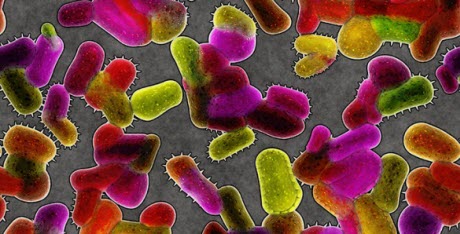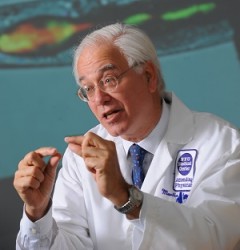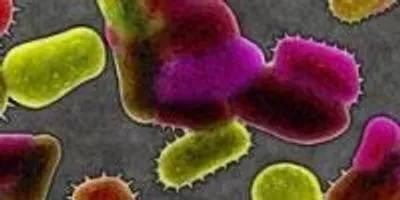 Bacteria under a microscope.iStock via Vanderbilt UniversityCould the microscopic fellow travelers that consider the human body to be their home – collectively known as the microbiome – have played an active role in shaping and maintaining this unusual aspect of human nature?
Bacteria under a microscope.iStock via Vanderbilt UniversityCould the microscopic fellow travelers that consider the human body to be their home – collectively known as the microbiome – have played an active role in shaping and maintaining this unusual aspect of human nature?
That is the speculative proposition advanced by Martin Blaser, professor of medicine and microbiology at NYU’s Langone Medical Center, and supported by mathematical models produced by Glenn Webb, professor of mathematics at Vanderbilt University. They present their argument in a paper titled, “Host demise as a beneficial function of indigenous microbiota in human hosts,” published online today in mBio, the journal of the American Society for Microbiology.
 Mathematician Glenn Webb.Neil Brake / VanderbiltScientists have known for a long time that every species of plant and animal acts as host for a distinctive collection of microorganisms. The human microbiome consists of about 100 trillion microbial cells, outnumbering the much larger human cells by about 10 to 1. Until recently they thought that the influence these microscopic communities have on their hosts was extremely limited. But recent research has found that their influence extends well beyond aiding digestion and producing bodily odors; they also aid brain development, reproduction and defense against infection. Taken together,the new evidence has led to the hologenomic theory of evolution, which proposes that the object of Darwin’s natural selection is not just the individual organism as he proposed, but the organism plus its associated microbial community.
Mathematician Glenn Webb.Neil Brake / VanderbiltScientists have known for a long time that every species of plant and animal acts as host for a distinctive collection of microorganisms. The human microbiome consists of about 100 trillion microbial cells, outnumbering the much larger human cells by about 10 to 1. Until recently they thought that the influence these microscopic communities have on their hosts was extremely limited. But recent research has found that their influence extends well beyond aiding digestion and producing bodily odors; they also aid brain development, reproduction and defense against infection. Taken together,the new evidence has led to the hologenomic theory of evolution, which proposes that the object of Darwin’s natural selection is not just the individual organism as he proposed, but the organism plus its associated microbial community.
Blaser got the idea for the impact of microbes on human age structure from his lifetime research on Helicobacter pylori, a bacterium found in the stomach of more than 50 percent of the world’s population.
H. pylori co-exists peacefully in people’s stomachs for most of their lives. It even has some beneficial effects. In 1996, for example, Blaser discovered that it may help regulate levels of stomach acid. However, H. pyloriis also a major cause of stomach cancer, a risk that increases with age.
“I began thinking that a real symbiont is an organism that keeps you alive when you are young and kills you when you are old. That’s not particularly good for you, but it’s good for the species,” Blaser said.
Webb’s expertise is the development of nonlinear differential equations to describe dynamic biological processes. So the microbiologist turned to him to see if they could come up with a mathematical model that would test this idea.
The approach they agreed upon was to create a model of an early hunter-gather population and see what role the microbiome might have played.
“We don’t have many facts to go on, so we don’t know what happened a thousand generations ago,” Webb said. “But differential equations are all about change and by comparing different rates of change to one another we can tell what works and what doesn’t work.”
One of their basic assumptions was that people haven’t changed much in the last 100,000 generations. In particular, they had the capability to live up to 120 years, which seems to be the current limit on human longevity. Of course, they had shorter average lifetimes because they had a number of sources of mortality that have been largely eliminated in modern society: fewer outbreaks of infectious diseases due to improved sanitation, reduction in back-breaking physical labor, increased availability of food, and modern medicines like antibiotics.
Their model divided the population into three different age groups: juvenile, reproductive and senescent. They looked at how the population would respond to different combinations of fertility and mortality rates. They developed a baseline case using the best estimates of these rates that they could find.
Then they added mortality risks based on particular microbial profiles.
In one version, they added a risk factor based on Shigella, one of the leading bacterial causes of diarrhea worldwide. This increased mortality only among children. It caused the population to crash.
In another version, they added an H. pylori-type mortality factor, one that increases with age.
 Microbiologist Martin Blaser.Courtesy of NYU Langone Medical CenterThey found that this decreased the percentage of the senescent population, which benefited the juvenile population by reducing the elderly’s demand on food and resources. The end result was stronger population growth and greater stability than the baseline case.
Microbiologist Martin Blaser.Courtesy of NYU Langone Medical CenterThey found that this decreased the percentage of the senescent population, which benefited the juvenile population by reducing the elderly’s demand on food and resources. The end result was stronger population growth and greater stability than the baseline case.
These results are consistent with Blaser’s contention that evolution may have acted on the human microbiome to favor bacteria like H. pylorithat target the aging. “This isn’t good for the individual, but it is good for the species,” Blaser said. Anything the bacteria can do to stabilize the human population benefits them because they loose their hosts if the population crashes.
They researchers also decided to see what happened when they doubled the fertility rate. The result was an unstable system that was thrown into catastrophic boom-bust cycles in response to disasters (events that caused major population loss).
In another variation, they increased the proportion of elderly in the hunter-gatherer population. They found it didn’t take much of an increase to force the population into a state of decline.
In addition to providing validation to the proposition that the microbiome may be shaping the human age structure, Webb observed that the modeling effort also reveals an underlying truth about human population growth. We have the right fertility and mortality rates to support our unusual age structure.
“If you go back 30,000 to 40,000 years ago, there were only 30,000 to 40,000 people in the world and they were scattered over Africa, Europe and parts of Asia,” said Webb. “Are we lucky just to be here? Or did we survive because our ancestors were robust enough to handle all the environmental changes and natural disasters they encountered? According to our equations, it was because they were robust enough.”
The research was supported in part by grants R01 GM63270 and R01 DK090989 from the National Institutes of Health and by grants from the Ellison Medical Foundation and the Diane Belfer Program in Human Microbial Ecology.















